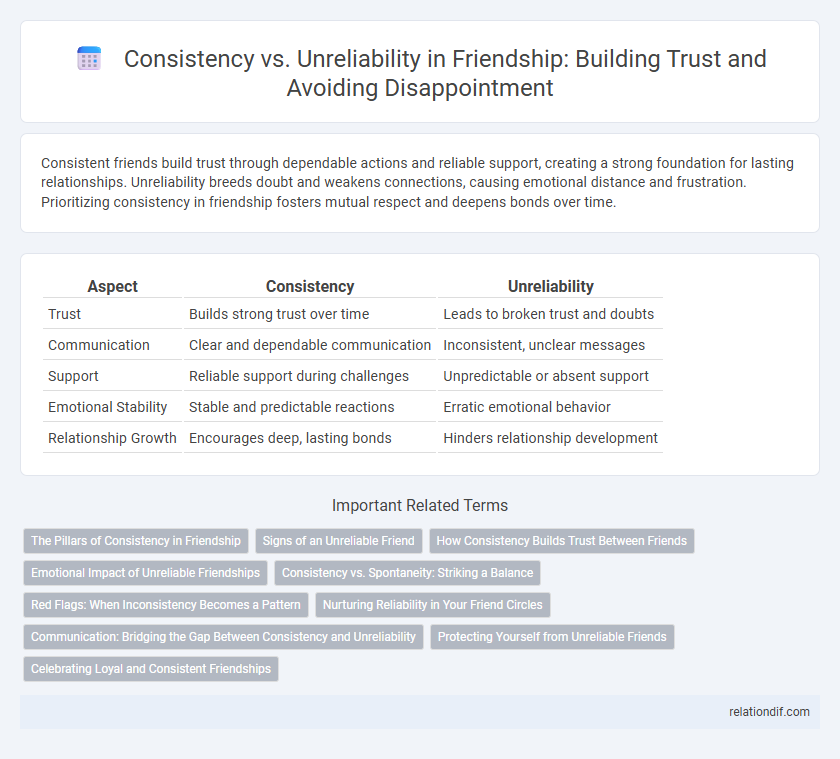Consistent friends build trust through dependable actions and reliable support, creating a strong foundation for lasting relationships. Unreliability breeds doubt and weakens connections, causing emotional distance and frustration. Prioritizing consistency in friendship fosters mutual respect and deepens bonds over time.
Table of Comparison
| Aspect | Consistency | Unreliability |
|---|---|---|
| Trust | Builds strong trust over time | Leads to broken trust and doubts |
| Communication | Clear and dependable communication | Inconsistent, unclear messages |
| Support | Reliable support during challenges | Unpredictable or absent support |
| Emotional Stability | Stable and predictable reactions | Erratic emotional behavior |
| Relationship Growth | Encourages deep, lasting bonds | Hinders relationship development |
The Pillars of Consistency in Friendship
The pillars of consistency in friendship include trust, reliability, and open communication, which foster a strong and lasting bond between individuals. Consistent friends show up during both good times and challenges, creating a dependable emotional support system. By prioritizing these foundational elements, friendships become resilient and deeply meaningful over time.
Signs of an Unreliable Friend
An unreliable friend often displays inconsistent communication patterns, frequently canceling plans or failing to follow through on promises, which erodes trust over time. They may also avoid offering support during difficult times, demonstrating a lack of emotional commitment. Recognizing these signs early helps preserve emotional well-being and set healthy boundaries in friendships.
How Consistency Builds Trust Between Friends
Consistency strengthens the foundation of trust in friendships by demonstrating reliability through regular, dependable actions and honest communication. Friends who consistently show up and support each other foster a safe environment where vulnerability is welcomed and mutual respect grows. This unwavering reliability contrasts sharply with unreliability, which undermines confidence and weakens emotional bonds.
Emotional Impact of Unreliable Friendships
Unreliable friendships often lead to emotional distress, fostering feelings of disappointment, mistrust, and abandonment. Inconsistent behavior from friends disrupts the sense of security and support essential for mental well-being. Over time, these emotional impacts erode the foundation of the relationship, making it difficult to maintain genuine connection and mutual respect.
Consistency vs. Spontaneity: Striking a Balance
Consistency in friendship cultivates trust and reliability, ensuring that friends feel supported during both good times and challenges. Embracing spontaneity adds excitement and unpredictability, preventing relationships from becoming monotonous or stagnant. Striking a balance between dependable presence and occasional surprises strengthens the bond, fostering deeper connection and mutual understanding.
Red Flags: When Inconsistency Becomes a Pattern
In friendship, consistency is a key indicator of trustworthiness, while repeated unreliability signals potential red flags. When someone frequently cancels plans last minute or fails to follow through on promises, it erodes the foundation of mutual respect and dependable support. Recognizing these patterns early helps protect emotional well-being and prioritize relationships that foster stability.
Nurturing Reliability in Your Friend Circles
Nurturing reliability in your friend circles builds trust and strengthens emotional bonds, creating a foundation for lasting friendships. Consistent actions, such as keeping promises and being present during challenging times, demonstrate commitment and foster mutual respect. Prioritizing dependability encourages open communication and resilience, helping friendships thrive despite life's uncertainties.
Communication: Bridging the Gap Between Consistency and Unreliability
Effective communication forms the cornerstone of trust in friendships, bridging the gap between consistency and unreliability by fostering transparency and understanding. Consistent communicators demonstrate reliability through timely responses and clear intentions, reinforcing emotional security. In contrast, unreliable communication breeds confusion and weakens bonds, highlighting the critical role of consistent dialogue in maintaining strong, lasting friendships.
Protecting Yourself from Unreliable Friends
Protecting yourself from unreliable friends requires setting clear boundaries and recognizing patterns of inconsistency, such as canceled plans or broken promises. Prioritize friendships with those who demonstrate reliability through regular communication and mutual support. Building a circle of dependable friends fosters emotional stability and reduces the stress caused by unpredictable behavior.
Celebrating Loyal and Consistent Friendships
Loyal and consistent friendships build a foundation of trust that withstands life's challenges, offering unwavering support and genuine connection. Consistency in friendship fosters emotional security, creating a safe space where individuals feel valued and understood. Celebrating these steadfast relationships highlights the profound impact of reliability in nurturing lasting bonds.
Consistency vs Unreliability Infographic

 relationdif.com
relationdif.com